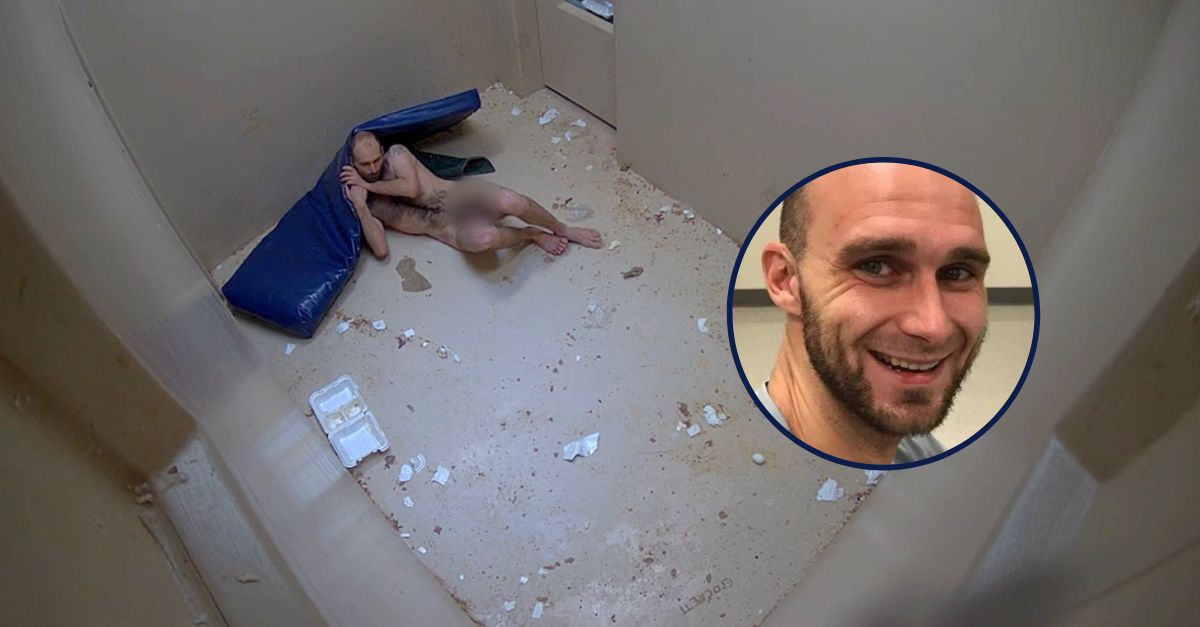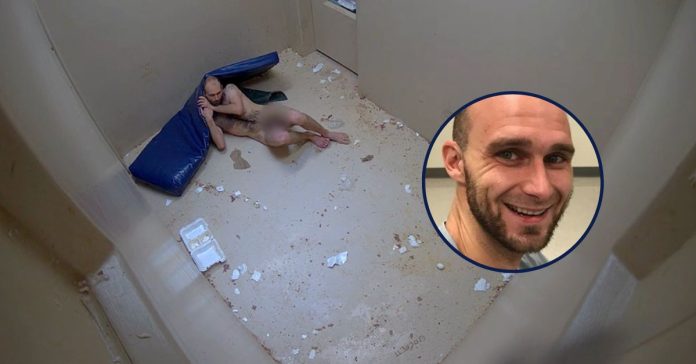
Joshua McLemore died after spending 20 days in a padded jail cell in Indiana without jailers doing anything to help the man who suffered from schizophrenia and intervened after it was too late, a lawsuit alleges. (Photos courtesy of the attorney for McLemore’s estate)
A county in Indiana has paid $7.25 million to the estate of a jail inmate with schizophrenia who died after being locked alone, naked, dehydrated, and malnourished in a filthy padded jail cell for nearly three weeks while jailers watched him decline and only intervened after it was too late.
Lawyers for Joshua McLemore, 29, said the settlement by Jackson County is believed to be the biggest payout for a jailhouse death in Indiana.
“The size of the settlement reflects the egregiousness of the jail’s mistreatment of Josh,” said Ed Budge, an attorney for McLemore’s estate, in a statement emailed to Law&Crime. “The video we obtained shows a young man in severe mental and physical distress, with no ability to care for himself, being ignored by the people responsible for his safety and well-being. The video reveals a level of indifference and inhumanity that should never be tolerated in a modern jail.”
Melita Ladner, McLemore’s aunt and only surviving close relative following the death of his mother in December 2022, said in a statement through the lawyers: “More than anything, I want this to be a wake-up call to Jackson County and every other jail. That was also the goal of Josh’s late mother, Rhonda McLemore. No other person should be made to suffer as Josh did, and I hope other families will be spared from similar pain.”
An attorney for Jackson County did not immediately respond to a request for comment from Law&Crime.
As Law&Crime previously reported, McLemore died on Aug. 10, 2021, after spending 20 days in “Padded Cell 7” at Indiana’s Jackson County Jail, the complaint said. He died after his arrest for pulling a nurse’s hair at a medical center emergency room during an “acute mental health crisis,” according to the lawsuit.
Attorneys said the jail had no mental health staff, and the nurse who worked there three or four days a week barely interacted with him and ignored the obvious risks of his condition. Litigation continues against the contractor, Advanced Correctional Healthcare, Inc., a private firm that runs health care at the facility.
Jessica Young, the president and chief executive of Advanced Correctional Healthcare, did not immediately respond to a request for comment from Law&Crime. But Young told The Indy Star April when the lawsuit was filed, “We take criticisms of the care provided by our team seriously. We are prohibited from disclosing patient information due to federal HIPAA privacy and confidentiality laws.”
A report by Jackson County Prosecuting Attorney Jeffrey Chalfant agreed with Indiana State Police that McLemore most likely died due to a prolonged lack of attention by Jackson County Jail staff but found jail employees committed no crimes.
“The Indiana State Police investigation did not uncover any evidence indicating that Mr. McLemore was knowingly or intentionally killed by another person, nor any evidence that his death was caused by a knowing, intentional, or reckless act,” Chalfant wrote.
The complaint details the events leading up to McLemore’s arrest and his death at Mercy West Hospital on Aug. 10, 2021, in Cincinnati.
After his arrest, he was placed in a small, windowless, padded isolation cell, lit 24 hours a day by fluorescent lights. He remained confined there, naked, alone, and in a constant state of psychosis for the next 20 days, the lawsuit alleged.
The only times he got to leave his cell “were when guards would forcibly remove him and strap him into restraint devices so they could put him under a shower and clean his cell,” court documents said.
He regularly spilled food on the floor and tore up the styrofoam boxes and paper bags his meals were delivered in, court documents said. The door to a bathroom attached to his cell was locked nearly the entire time he was there, court documents said. The prosecutor’s report said the door is locked for safety reasons and unlocked at the inmate’s request, but McLemore did not ever ask for access to the restroom or shower, the prosecutor wrote.
The lawsuit claims he urinated and defecated on the floor, and food and trash were often mixed with urine or feces. The prosecutor said he frequently urinated in his cell but noted that in reviewing jail video, he did not see him ever defecate in his cell.
The jail staff cleaned the cell three times during his 20-day incarceration, but within hours of it being cleaned, it was in disarray again, the prosecutor wrote.
When he entered the jail, he weighed 197.8 pounds and appeared fit and robust. While inside, he ate and drank very little and lost almost 45 pounds in less than three weeks, court documents said. He was under constant watch, and a real-time video feed showed his movements, but jailers “did nothing to intervene or secure needed medical or mental health care until it was too late,” the complaint alleged.
When he was finally sent to the hospital, his condition was so dire that the hospital did not have the resources to treat him, court documents said. He was airlifted to a larger hospital in Cincinnati, where he died two days later, the lawsuit said.
The autopsy listed his cause of death as “multiple organ failure due to refusal to eat or drink with altered mental status due to untreated schizophrenia.”
Also listed as a significant condition contributing to his death but not related to the terminal disease condition was a history of methamphetamine withdrawal, the prosecutor said.
The manner of death was listed as natural.
The complaint documented McLemore’s life, from being raised by a single mother in Mississippi to his hobbies of reading, playing chess and video games, and watching sports. His mother, a former U.S. Navy member, died unexpectedly about 16 months after her son died, court documents said.
The complaint said he started having drug use and mental health problems in high school. He was eventually diagnosed with schizophrenia and had been in a mental institution four times in Mississippi.
“Over the years, he received inpatient psychiatric treatment on various occasions and experienced periods of relative stability that allowed him to work and enjoy life,” court documents said. “But unfortunately, the mental illness and drug problems returned.”
Have a tip we should know? [email protected]

